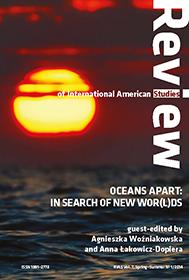The ‘Oceanic feeling’ in Stephen Crane’s “The Open Boat” and S.T. Coleridge’s “The Rime of the Ancient Mariner”
The ‘Oceanic feeling’ in Stephen Crane’s “The Open Boat” and S.T. Coleridge’s “The Rime of the Ancient Mariner”
Author(s): Claudia Ioana DoroholschiSubject(s): Anthropology, Social Sciences, Language and Literature Studies, Studies of Literature, Comparative Study of Literature, Other Language Literature, Culture and social structure
Published by: Wydawnictwo Uniwersytetu Śląskiego
Summary/Abstract: Stephen Crane’s “The Open Boat” is a fictionalized account of the writer’s experience of surviving the shipwreck of the Commodore, a steamboat on which he was heading for Cuba to act as a war correspondent. The present paper explores Crane’s account of the encounter between man and sea, setting it against the background of Coleridge’s “Rime of the Ancient Mariner”, which Crane’s story echoes on several occasions, at key points in the plot. It examines the two texts in the light of the concept of ‘oceanic feeling’, as defined by Romain Rolland and Sigmund Freud, who both use the metaphor of the ocean as a site of the sublime to speak of a sense of oneness, of connectedness between man and world. While in Coleridge’s poem the Mariner first loses and subsequently recovers a mystical connection with nature, Crane’s short story seems to decode the events in a psychological rather than mystical key. Thus, it seems to suggest that a sense of oneness with nature is not the result of any transcendent connection between man and his surroundings, but merely a projection of the subject’s emotions onto an indifferent nature.
Journal: Review of International American Studies
- Issue Year: 7/2014
- Issue No: 1
- Page Range: 151-162
- Page Count: 12
- Language: English

